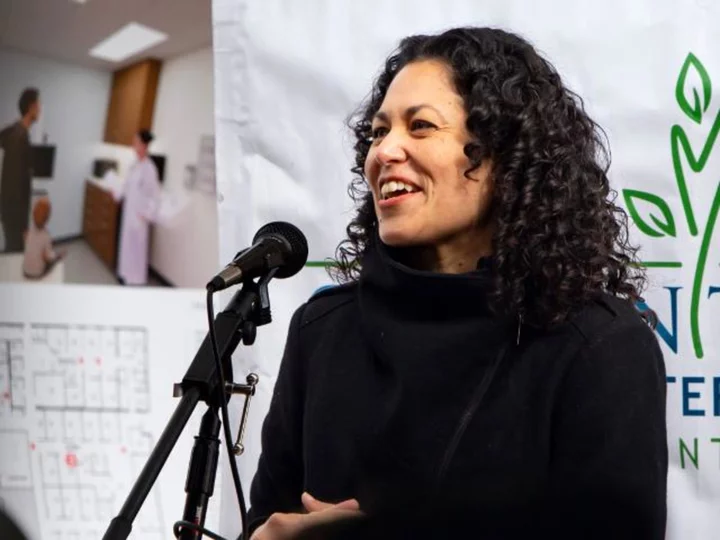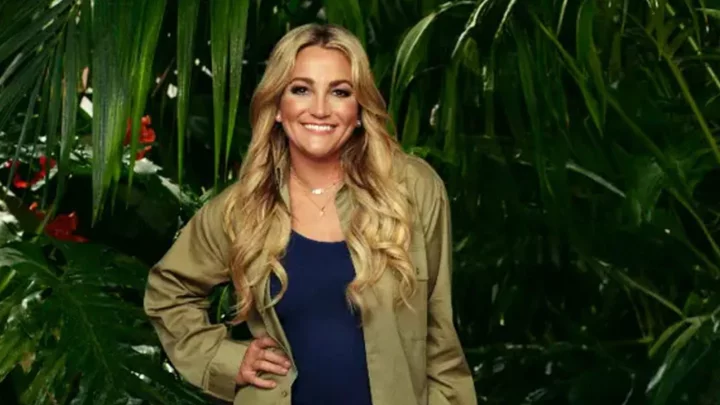Xochitl Torres Small was sworn in as deputy agriculture secretary of the US Department of Agriculture on Monday, making history as the first Latina in the No. 2 position.
Her ascension to the position comes amid efforts by the USDA to rectify decades of discrimination against farmers of color and as the department seeks to increase diversity in a workforce that is predominantly White. It also comes as farmers and ranchers grapple with the effects of climate change, particularly in the West, which is facing wildfires, drought and extreme heat.
Torres Small, who has been under secretary for rural development at the USDA since October 2021, was confirmed by the Senate as deputy agriculture secretary last week with large bipartisan support. She succeeds Jewel Bronaugh, the first Black woman in the No. 2 position at the USDA, who stepped down in February.
"My mission is to serve the people of USDA every single day," Torres Small said to a crowd of employees, supporters and family.
"I'm thrilled to get to work on behalf of the people of the people's department," she added.
During her time leading rural development, Torres Small oversaw 4,000 employees and various programs, including those to expand broadband internet access to rural communities. She will now oversee a vast workforce of over 100,000 employees across 29 agencies, which has seen a slight uptick in the number of employees of color in recent years. According to USDA data from February 2023, 73% of USDA employees are White, 28% are employees of color including 10% who identify as Latino. Forty-five percent of USDA employees are women.
She will also be tasked with implementing the recommendations brought forth by the Equity Commission, an independent panel charged with identifying policies and programs in the department that contribute to inequity and discrimination. The commission is expected to release a final report of its findings later this year though some recommendations from its interim report are already being implemented.
Torres Small previously served two terms in the US House and was the first woman and person of color representing New Mexico's 2nd Congressional District.
A 'tremendous uplift'
Her nomination has been praised by Latino advocacy groups and farm organizations, including the League of United Latin American Citizens. The presence of Latina in a high position over the department is "tremendous" at a time when the USDA is trying to reestablish trust with farmers and ranchers, said Eugene Pickett, the vice president of Latino Farmers & Ranchers International, Inc, a technical support and advocacy group.
Torres Small grew up in Las Cruces, New Mexico, which sits in the fertile ground of the Mesilla Valley, and has previous experience with rural development -- aspects Pickett say will bring a crucial understanding on issues of land loss. Her previous work as a water rights lawyer will also bring an instrumental perspective on climate issues.
"We have trusted people in positions of authority that can create the bridge and the impact. And what is that, that's gonna mean, you know, like a tremendous uplift. Not just in the Latino community but in all the communities of color," he said.
The USDA has faced several discrimination lawsuits in the past and in February 2011 announced $1.33 billion in cash awards and tax relief payments for Hispanic and women farmers and ranchers who had faced discrimination from the department. The department announced earlier this month it is accepting applications for financial relief of up to $500,000 for farmers who have faced discrimination in its lending programs.
Her presence in the department signifies a "strong reminder" that those who shape and are involved in the food system can also become part of the people that govern and shape the food system," Vanessa García Polanco, policy campaigns co-director of the National Young Farmers Coalition, told CNN.
"We have to remember that most Latino and people of color are 80% of our food system, many of them as farm workers or food system workers," García Polanco said. "When I see a third generation Latina becoming the second-in-command over USDA that gives me a lot of hope as an immigrant and as a Latina myself. There are governing systems that are being reflective of the people who shape them and people who are on them."
Out of 3.4 million farmers in the US, 112,451 identified as Hispanic, Latino or Spanish, according to the most recent USDA census.









